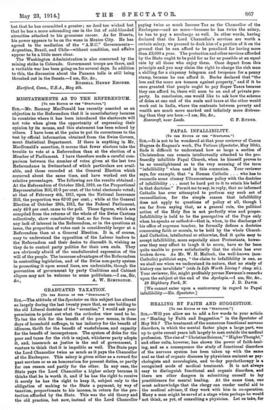GRADUATED TAXATION.
[To ras EDITOR 07 ma "Sercmos.1
SIR,—The attitude of the Spectator on this subject has altered so largely during the last twenty years that, as one bolding to the old Liberal doctrine of the " seventies," I would ask your permission to point out what the orthodox view used to be. To tax the rich for the benefit of the poor means, in these days of household suffrage, to tax industry for the benefit of idleness, thrift for the benefit of wastefulness, and capacity for the benefit of incompetence. The system of doles for the poor and taxes for the rich is unjust, whichever party adopts it, and, inasmuch as justice is the end of government, I venture to think that it is impolitic as well. The State pays the Lord Chancellor twice as much as it pays the Chancellor of the Exchequer. This salary is given either as a reward for past services or as an honorarium for present duties, or partly for one reason and partly for the other. In any case, the State pays the Lord Chancellor a higher salary because it thinks that he is worth it, and if he has the right to receive it surely he has the right to keep it, subject only to the obligation of making to the State a payment, by way of taxation, proportionate to his income, in return for the pro- tection afforded by the State. This was the old theory and the old practice, but now, instead of the Lord Chancellor paying twice as much Income Tax as the Chancellor of the Exchequer—and no more—because he has twice the salary, be has to pay a surcharge as well. In other words, having declared that the Lord Chancellor's services are worth a certain salary, we proceed to dock him of a portion of it on the ground that he can afford to be penalized for having more than £3,000 a year. The protection and other services afforded by the State ought to be paid for as far as possible at an equal rate by all those who enjoy them. Once depart from this principle and you may claim the right to charge the rich man a shilling for a sixpenny telegram and twopence for a penny stamp, because he can afford it. Burke declared that "the less and the more are treason against property," and if it be once granted that people ought to pay Super Taxes because they can afford to, there will soon be an end of private pro- perty. In conclusion, one would like to ask how the scheme of doles at one end of the scale and taxes at the other would work out in India, where the contrasts between poverty and wealth are much more marked and infinitely more distress- ing than they are here.—I am, Sir,














































 Previous page
Previous page